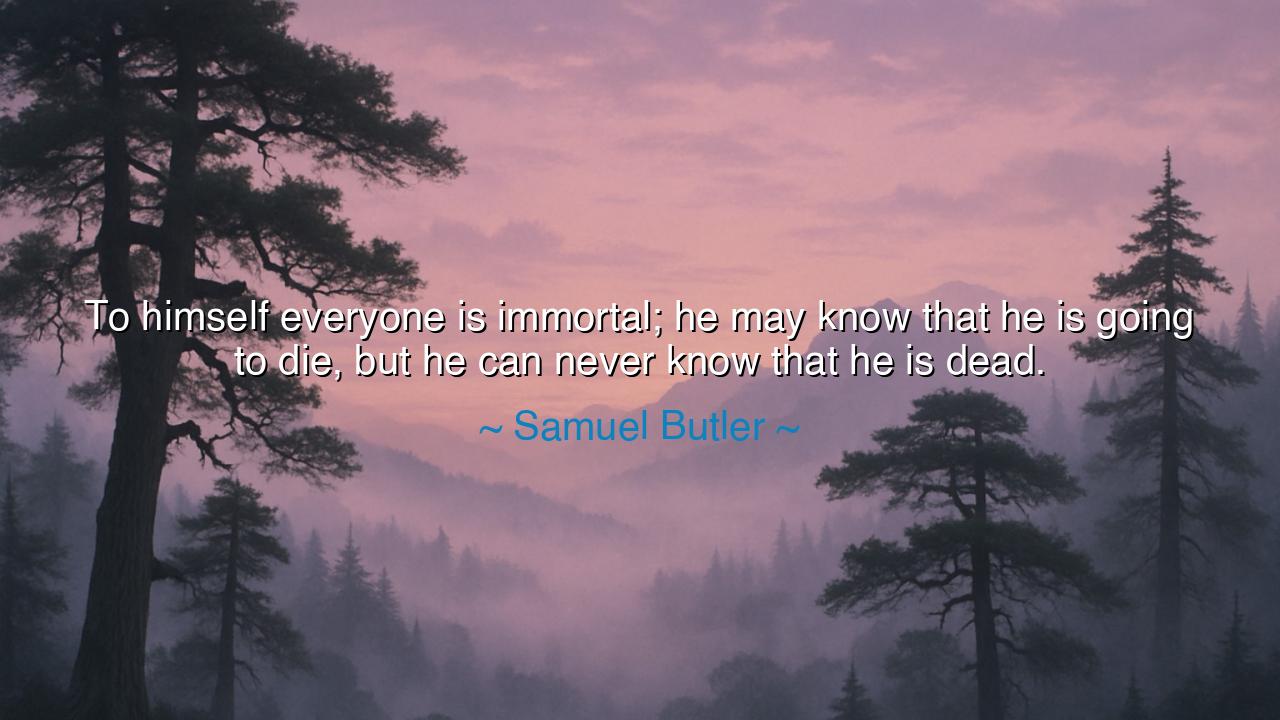
To himself everyone is immortal; he may know that he is going to
To himself everyone is immortal; he may know that he is going to die, but he can never know that he is dead.






The words of Samuel Butler, “To himself everyone is immortal; he may know that he is going to die, but he can never know that he is dead,” descend from the quiet meditation of a mind that had wrestled deeply with the mysteries of life and consciousness. Butler, a Victorian thinker and satirist, lived in an age torn between science and faith, between the promise of Darwin’s discoveries and the yearning for eternal meaning. In this paradoxical statement, he captures a profound truth about the nature of human awareness — that though man understands death as concept, he can never experience it as reality. For consciousness, the light by which we know all things, cannot perceive its own extinction. To oneself, therefore, one is forever alive, for the end of perception is also the end of knowing.
To the ancients, this insight would have been considered a sacred paradox — one that touches the edge of eternity. Socrates, on the eve of his death, told his followers not to fear the end, for “death is either a dreamless sleep or a new beginning.” In both cases, he said, there is no suffering to the one who dies. Butler’s reflection walks a similar path: it suggests that what we fear most is not death itself, but the idea of death. The living can imagine their own absence, but they cannot know it, for the knower must exist to know. Thus, even as we move toward mortality, our sense of “I” — that inner witness — feels untouched, untouchable, and in some mysterious way, eternal.
This quote also speaks to the self-centeredness of human perception, not in arrogance, but in essence. The mind, as long as it functions, can only conceive of a world through its own lens. When Butler says that each man is “immortal to himself,” he is revealing that consciousness, by its very nature, assumes continuity. Even when we dream of death, we are still dreaming — still aware. To imagine being dead is impossible, because awareness cannot simulate its own absence. Death, therefore, lies beyond knowledge, beyond the reach of experience. And so, we live as immortals within the boundaries of our perception, always surrounded by the illusion of endlessness.
Consider the story of Marcus Aurelius, the Roman emperor and Stoic philosopher. In his Meditations, written in the shadow of war and mortality, he often reminded himself that death is simply “a dissolution of the elements.” Yet he faced it calmly, knowing that the self which fears death can never actually witness it. His acceptance was not resignation but peace — an understanding that life and death are not opposites but continuities, like waking and sleeping. Marcus, like Butler, saw that what we call death is a mystery that exists only for the living; for the one who passes beyond, there is no pain, no awareness, no fear. There is only the end of knowing.
In another sense, Butler’s statement is not about death at all, but about consciousness and identity. It invites us to realize that the self — the “I” that watches and thinks — is boundless in perception. It has no experience of nonexistence, and thus believes in its own infinity. This may be the root of humanity’s spiritual longing, the reason we build temples, write scriptures, and dream of afterlives: not because we cannot accept death, but because the mind cannot conceive of nothingness. It is always the light, never the darkness it shines upon.
Yet this truth is not meant to comfort alone. There is also humility in it — a reminder that what we fear most is a shadow we can never truly meet. Therefore, the wise learn to live without dread, to see life not as a countdown but as a flame that burns brightly for its appointed time. Knowing that we cannot know death, we are freed to dwell more deeply in the mystery of life. For every moment we are aware, we are participating in something unbroken — the great chain of consciousness that binds all living things.
So, my listener, take this teaching to heart: do not fear the unknowable. Death is not your enemy, for it cannot be known by you. Live not in anticipation of an end, but in reverence for the miracle of perception itself. Every sunrise, every breath, every thought is an act of immortality, for in that moment, you are fully alive — beyond time, beyond end. And when your lamp finally fades, you will not know the darkness, for you will already have become part of the dawn that no shadow can extinguish.






AAdministratorAdministrator
Welcome, honored guests. Please leave a comment, we will respond soon